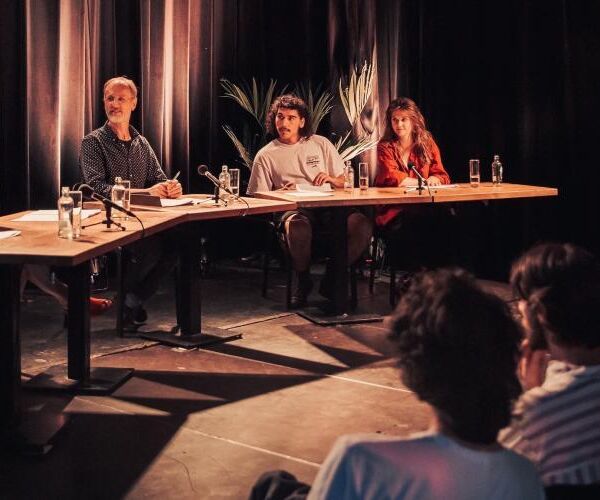Writing
In the Writing Program, you will be initiated into the art of storytelling. You will learn how to create stories for various genres and media.
In the Writing Program, you will be initiated into the art of storytelling. You will learn how to create stories for various genres and media.
The basis is the fiction screenplay. After an extensive general introduction to the audiovisual medium, you will further master the technical and theoretical aspects of screenwriting. As the course progresses, the view widens to other narrative forms and storytelling traditions. Radio, documentary and animation are also covered, as well as prose, theater, graphic novel, etc. Through this multidisciplinary approach, you will learn to better understand and use the similarities and differences between the diverse narrative forms. You also get the chance to discover where your personal talents and preferences lie, so that you can graduate with a fully-fledged master's thesis in the writing discipline of your own choice.
The writing program rests on two main pillars: learning writing skills and developing a personal trajectory. In theoretical classes, workshops and workshops, ample attention is paid to acquiring the necessary theoretical knowledge and craft skills to tell a story properly. Gradually, the emphasis becomes more and more on developing your own style and personality. A team of skilled teachers, often with both feet firmly still in practice, guides you in the difficult search for your own voice. The emphasis shifts from “How do I tell a story?” to “What story do I want to tell and why?
The goal is to train inventive and versatile storytellers who can work in a variety of disciplines and work environments after graduation. Because, whether you work alone or in a writing team, on assignment or on your own initiative, for audiovisual fiction, prose or theater, the essence always remains the same: you create a story for an audience, a story that captivates and touches.
All our classes are in Dutch.

Bachelor
In the first year of the bachelor’s programme, as a writing student, you will explore the fundamental audiovisual concepts alongside students from directing, production, cinematography, sound design, and editing. You will be immersed in the history of art, culture, and film; receive your first lessons in screenwriting, directing, and production; and participate in joint practical sessions for fiction and documentary. This lays the groundwork for future collaborations, each from their increasingly specialised disciplines. As the year progresses, the approach becomes more practice-oriented. You will write, direct, and produce projects for both fiction and non-fiction, giving you the opportunity to discover where your talents lie, enabling you to make a well-informed choice by the end of the year.
If you choose to focus on writing, you will further hone your storytelling skills. You will continue to attend joint classes with other students at the school, but you will also take separate writing courses, such as dramaturgy and text analysis. Individual exercises will provide you with the opportunity to refine your writing skills in various genres and disciplines under the guidance of experienced instructors. At the same time, you will continue to develop stories in collaboration with students from directing, animation, production, radio, and dramatic arts, thereby gaining valuable practical experience.
Master
The master’s year primarily focuses on the master’s thesis. During your bachelor years, you have acquired the necessary craft skills in writing, but as you progress, the emphasis increasingly shifts towards developing a personal journey. In the master’s programme, there is time for deeper exploration and reflection. Various lessons and workshops are entirely geared towards supporting your master’s thesis. Instructors will closely examine specific aspects of your thesis, helping you to develop your personal vision regarding characters, themes, and narrative structure in greater depth.
At the same time, under the mentorship of a supervisor of your choosing, you will produce written work in your chosen discipline: screenwriting, prose, theatre, graphic novel, etc. This master’s thesis will be presented at the end of the year to a jury of independent professionals, who will assess the formal and substantive value of your work according to the most contemporary professional standards.
Shortened track
If you already have a degree and would like to follow a shortened writing track, you can participate in the admission test for the shortened track. You follow a transition program when you want to advance from a professional bachelor to a Master. You follow a preparation program when you have an academic education and want to move on to our Master. Both are 'shortened' programs and do not entitle you to the bachelor's degree, but they do entitle you to admission to the Master.
ECTS sheets
If you want detailed info on the subjects (assessment, examination formats...), please visit our study guide where you can find all ECTS sheets of our programmes. The ETCS fiches for Shortened track here.
Admission tests
Admission testTo start this programme, you must first pass an artistic admission test. The admission test consists of three parts: a dossier, an intake or selection interview and a workshop week. Read more about the admission tests here.
Quality education
Erasmushogeschool Brussel pursues quality education and continuously develops its programmes to meet (inter)national quality standards. EhB puts maximum effort into developing a culture of quality and uses its own quality direction as a foundation for quality education.Various instruments guarantee the strengthening and safeguarding of the educational quality of this programme:
In 2016, a programme accreditation took place for the Bachelor of Arts in audiovisual arts. Read the full report.
The Dutch-Flemish Accreditation Organisation (NVAO) decided to accredit this programme for the period 2016 to 2024 in the accreditation decision.
The Flemish government's opleiding in cijfers website provides information on the profile of this programme such as who follows this programme, how long students take to obtain their degree, etc.Read more about quality assurance within EhB.